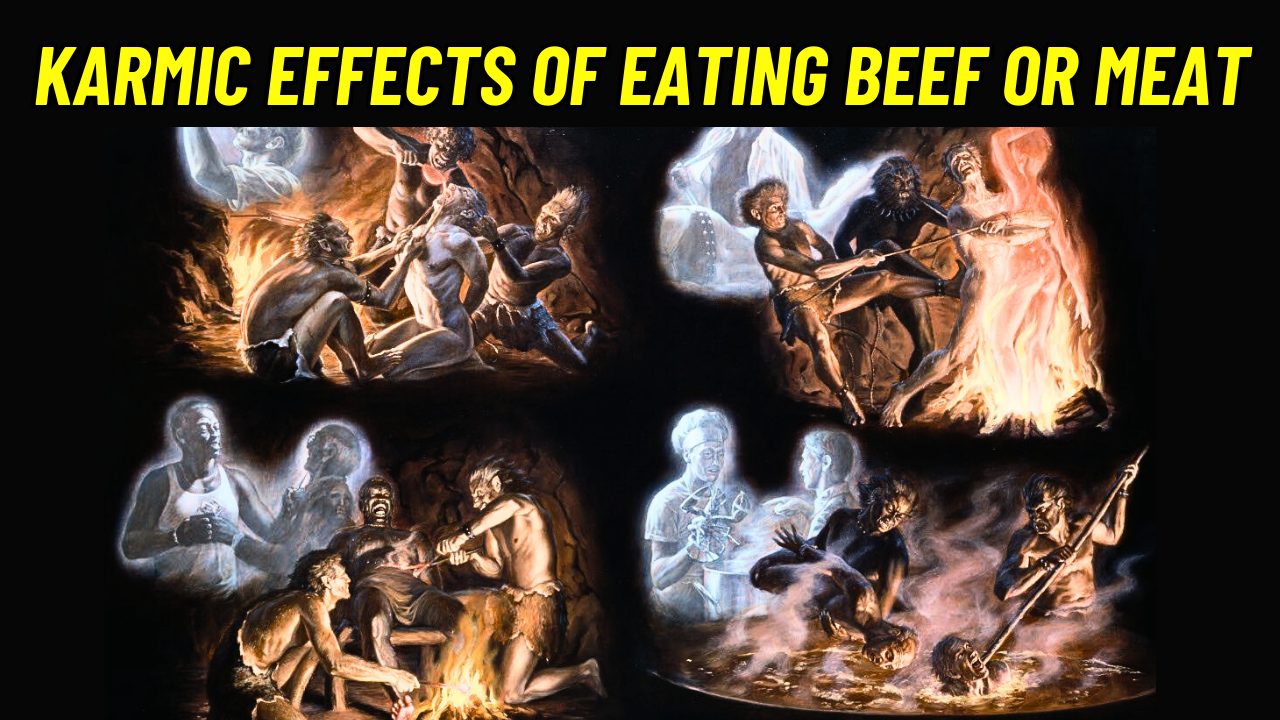In the ancient wisdom of Vedic philosophy, the concept of karma reigns supreme, asserting that our actions reverberate through time, shaping our present and future experiences. This profound principle extends to various facets of life, including the food we consume. As we delve into the Vedic scriptures, such as the Rigveda, Bhagavad Gita, and Manusmriti, intriguing insights emerge regarding the potential karmic effects of eating meat or beef. In this journey of exploration, we will uncover the significance of ahimsa (non-violence) in dietary practices and reflect on the complexities of modern ethical considerations. Join us in understanding the interconnectedness of our food choices with the spiritual fabric of existence.
I. Understanding the Vedic Philosophy on Karma and Its Impact on Life
The Vedic philosophy traces its origins back to the sacred texts of ancient India, emphasizing the principle of karma as a fundamental aspect of existence. Karma is the law of cause and effect, suggesting that the intent and actions of an individual influence their future. In the context of diet, the Vedic scriptures impart valuable insights on how our food choices can impact our spiritual journey.

II. Exploring the Relevance of Vedic Scriptures in Karmic effects of eating meat or beef
A. Rigveda: Insights into the Law of Karma and Its Application in Daily Life
The Rigveda, the oldest of the Vedic texts, provides essential teachings on karma and its practical application in our day-to-day lives. While not explicitly addressing meat consumption, the Rigveda highlights the significance of conscious actions and living in harmony with nature. Some interpretations suggest that abstaining from harming animals aligns with the spirit of karma as it fosters compassion and respect for all living beings.
B. Bhagavad Gita: Understanding the Concept of Karma Yoga and Its Relevance Today
The Bhagavad Gita, a profound spiritual dialogue between Lord Krishna and the warrior Arjuna, introduces the concept of Karma Yoga. Karma Yoga is the path of selfless action and devotion, emphasizing the intention behind actions rather than the outcomes. Applying this principle to dietary choices, one might consider consuming food with gratitude, mindful of its sources and impact on others.
C. Manusmriti: Examining Ancient Laws and Guidelines Related to Food Choices
The Manusmriti, an ancient legal text, outlines guidelines for ethical living, including aspects of diet. While it acknowledges that some rituals involved animal sacrifice, it also advocates for non-violence (ahimsa) and respect for all beings. Interpretations of the Manusmriti vary, leading to debates on whether its teachings permit or prohibit meat consumption.
III. The Significance of Ahimsa (Non-Violence) in Vedic Philosophy
A. Ahimsa as the Core Principle of Vedic Dietary Practices
Ahimsa, the principle of non-violence, holds paramount importance in Vedic philosophy. It extends beyond physical harm and encompasses avoiding harm through thoughts, words, and actions. Applying ahimsa to dietary choices means opting for a compassionate diet that minimizes harm to animals and the environment.
B. How Ahimsa Extends to Consuming Meat or Beef: Dilemmas and Perspectives
The concept of ahimsa raises ethical dilemmas when it comes to consuming meat or beef. Some argue that killing animals for food contradicts the principle of non-violence, while others point to historical and cultural contexts where meat consumption was ritualistic and symbolic rather than for mere sustenance.
C. Navigating Modern Ethical Considerations Alongside Vedic Teachings
In our modern, interconnected world, ethical considerations around food choices have become increasingly complex. Balancing Vedic teachings with contemporary perspectives requires introspection and adaptation, as individuals seek to make informed choices that align with their values and respect for life.
IV. Interpretations of Vedic Scriptures on Karmic effects of eating meat or beef
A. Different Schools of Thought: Debates on Whether Vedic Texts Prohibit Meat Eating
Interpreting Vedic scriptures regarding meat consumption has given rise to diverse perspectives within the Hindu community. Some argue that the underlying principles of karma and ahimsa discourage the killing of animals for food. Others maintain that certain rituals and historical practices involving animal sacrifice should not be directly equated with present-day dietary choices.
B. The Concept of “Yajna” and Sacrificial Offerings: Does It Justify Meat Consumption?
The Vedic concept of “yajna” involves ritualistic offerings, including animal sacrifices, as part of ancient ceremonies. While these practices existed, the context and symbolism were vastly different from today’s meat consumption. Some believe that “yajna” underscores the cyclical nature of life, where offerings represent a symbolic sacrifice, rather than an endorsement of widespread meat consumption.
C. Exploring the Notion of “Prarabdha Karma” and Its Relation to Food Choices
“Prarabdha karma” refers to the portion of one’s accumulated karma that manifests in the present life, influencing circumstances and experiences. From this perspective, an individual’s dietary preferences might be attributed to their past karma. Understanding the intricacies of “prarabdha karma” encourages contemplation on the spiritual significance of one’s food choices.

V. Scientific Perspectives on the Karmic effects of eating meat or beef
A. Analyzing Studies on the Psychological Impact of Dietary Choices on Moral Outlook
Scientific research has begun to explore the psychological effects of food choices on moral attitudes and behavior. Studies suggest that individuals who adopt diets based on compassion and sustainability may experience a positive impact on their ethical outlook and behavior towards others.
B. Environmental Implications of Meat Consumption and Their Potential Karmic Consequences
The environmental impact of meat production has become a matter of global concern. Raising animals for food contributes significantly to greenhouse gas emissions, deforestation, and water pollution. As the consequences of environmental degradation unfold, some ponder the potential karmic repercussions of exploiting the Earth’s resources unsustainably.
C. Linking Personal Health and Karmic Balance: The Impact of Diet on Well-Being
Beyond spiritual considerations, there is a growing awareness of how dietary choices affect individual well-being. Adopting a diet aligned with Vedic principles of compassion may promote physical health and emotional harmony, creating a positive connection between personal choices and karmic equilibrium.
VI. Navigating Karmic effects of eating meat or beef in a Globalized World
A. The Cultural Context: Understanding Meat Consumption in Different Societies
Meat consumption varies across cultures, influenced by tradition, geography, and historical practices. Recognizing these cultural differences is essential when exploring the karmic implications of dietary choices and respecting diverse perspectives on food and ethics.

B. Balancing Personal Choices with Societal and Ethical Obligations
Living in a multicultural and interconnected world necessitates thoughtful consideration of personal choices in light of broader societal and ethical responsibilities. Individuals may seek harmony between their spiritual convictions and the impact of their decisions on the collective welfare of humanity and the planet.
C. Finding Middle Ground: How to Apply Vedic Teachings in Diverse Modern Lifestyles
Applying Vedic teachings to contemporary lifestyles requires a nuanced approach. Embracing the essence of Vedic principles, such as ahimsa and mindful living, individuals can adapt these teachings to suit their unique circumstances and strive for greater balance and understanding.
VII. Practical Tips for Individuals Seeking to Align Diet with Vedic Principles
A. Embracing Vegetarianism or Veganism: Strategies for a Compassionate Diet
Transitioning to a vegetarian or vegan diet represents a conscious step towards aligning with Vedic principles of ahimsa. Gradual shifts in dietary habits, accompanied by education on plant-based nutrition and creative cooking, can make the transition more sustainable and enjoyable.
B. Making Mindful Choices: Sourcing Meat and Beef Consciously and Ethically
For those who choose to consume meat or beef, conscious sourcing is key to reducing the negative impact on animals and the environment. Opting for ethically raised, grass-fed, and hormone-free options can foster a sense of responsibility and mindfulness in one’s dietary practices.
C. Incorporating Spiritual Practices: Rituals and Mantras to Bring Awareness to Food Choices
Incorporating rituals and mantras before meals can enhance mindfulness and gratitude towards food. Taking a moment to appreciate the interconnectedness of all life and expressing gratitude for the nourishment received fosters a deeper spiritual connection to food and the universe.
VIII. Conclusion
A. Recapitulation of Vedic References on Karmic Effects of Consuming Meat or Beef
The Vedic references on karma, ahimsa, and dietary choices offer profound insights into the potential karmic effects of consuming meat or beef. As we navigate our paths in the modern world, these teachings encourage us to contemplate the consequences of our actions and embrace compassion in our daily lives.
B. Emphasizing the Importance of Conscious Eating and Its Influence on Karma
Conscious eating transcends cultural boundaries and connects us to a deeper understanding of the impact of our choices. By consciously considering the karmic implications of our diet, we become active participants in shaping a more harmonious and compassionate world.
C. Encouraging Further Exploration of Vedic Teachings and Their Relevance in Modern Life
The Vedic teachings provide timeless wisdom that remains relevant in our rapidly changing world. As we delve deeper into these scriptures, let us continually seek wisdom and guidance from the past to inform our present choices and shape a future of spiritual growth and interconnectedness.
In conclusion, the Vedic philosophy enlightens us on the profound interplay between our dietary choices and the karmic effects they may entail. By exploring the wisdom of the Rigveda, Bhagavad Gita, and Manusmriti, we gain valuable insights into the principles of karma and ahimsa, guiding us toward a more conscious and compassionate approach to our diets. Scientific perspectives further reinforce the significance of mindful food choices, not only for individual health but also for the well-being of the planet and all living beings.
As we navigate our way through a globalized world with diverse cultural backgrounds, it becomes imperative to strike a harmonious balance between personal choices and societal responsibilities. By embracing the core tenets of Vedic philosophy and adapting them to contemporary lifestyles, we can make conscious decisions that foster spiritual growth and positive karmic impacts. Whether choosing a vegetarian or vegan diet or consciously sourcing meat and beef, every small step towards compassionate eating can contribute to a more harmonious and interconnected world.
Therefore, let us delve deeper into the timeless wisdom of the Vedas, fostering awareness and understanding, and embark on a journey towards conscious eating, mindful living, and a greater sense of unity with all of existence.
Frequently Asked Questions (FAQ) on Vedic References on Karmic Effects of Consuming Meat or Beef
1. What is the significance of karma in Vedic philosophy?
– Karma is a fundamental concept in Vedic philosophy, representing the law of cause and effect. It suggests that our actions, intentions, and thoughts influence our present and future experiences.
2. How do Vedic scriptures address the topic of meat or beef consumption?
– Vedic scriptures like the Rigveda, Bhagavad Gita, and Manusmriti do not explicitly prohibit or endorse meat consumption. However, they offer insights into broader principles like karma, ahimsa, and conscious living that are relevant to dietary choices.
3. What is ahimsa, and how does it relate to dietary practices?
– Ahimsa is the principle of non-violence or non-harming. It encourages individuals to make compassionate choices, including dietary ones, that minimize harm to animals and the environment.
4. Does the Bhagavad Gita promote vegetarianism or veganism?
– The Bhagavad Gita emphasizes Karma Yoga, the path of selfless action and devotion. While it doesn’t explicitly advocate for vegetarianism, its teachings on conscious actions and intentions align with compassionate dietary choices.
5. Are there different interpretations of Vedic teachings on meat consumption?
– Yes, within the Hindu community, there are varying interpretations of Vedic scriptures regarding meat consumption. Some emphasize the importance of ahimsa and non-violence, while others consider historical rituals and cultural contexts.
6. Can adopting a vegetarian or vegan diet have karmic benefits?
– Embracing a vegetarian or vegan diet, driven by compassion and awareness, can lead to positive karmic effects due to reduced harm to living beings and a more sustainable impact on the environment.
7. How does meat consumption affect the environment and karma?
– The environmental impact of meat production, such as deforestation and greenhouse gas emissions, can have far-reaching consequences. Consuming meat in an unsustainable manner may raise ethical concerns related to karma and ecological balance.
8. How can I align my diet with Vedic principles on karma and ahimsa?
– You can align your diet with Vedic principles by adopting a vegetarian or vegan diet, sourcing meat ethically, and practicing mindfulness and gratitude during meals.
9. Can reciting mantras before meals impact the karmic effects of food consumption?
– The practice of reciting mantras before meals can cultivate mindfulness and gratitude, enhancing the spiritual connection to food and potentially influencing the karmic effects of our dietary choices.
10. How can I reconcile Vedic teachings with diverse cultural practices around meat consumption?
– Balancing Vedic teachings with cultural diversity requires open-mindedness and respect for different perspectives. Seeking common ground in ethical and compassionate living can help navigate this intersection.
Shop amazing Anunnaki Merchandise at our store, Follow us on Facebook, Instagram, And For More Interesting Content Also Subscribe To Our Youtube Channel.






